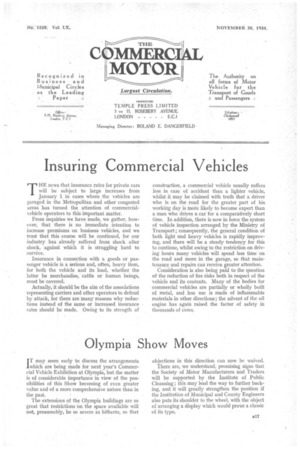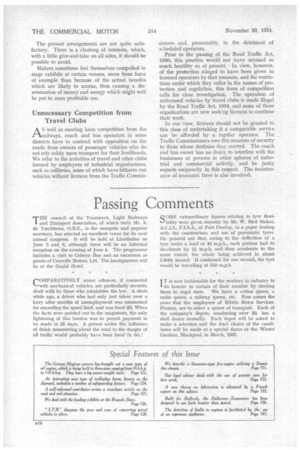Olympia Show Moves
Page 35

Page 36

If you've noticed an error in this article please click here to report it so we can fix it.
IT may seem early to discuss the arrangements .1.which are being made for next year's Commercial Vehicle Exhibition at Olympia, but the matter is of considerable importance in view of the possibilities of this Show becoming of even greater value and of a more comprehensive nature than in the past.
The extensions of the Olympia buildings are so great that restrictions on the space available will not, presumably, be so severe as hitherto, so that objections in this direction can now be waived.
There are, we understand, promising signs that the Society of Motor Manufacturers and Traders will be supported by the Institute of Public Cleansing ; this may lead the way to further backing, and it will greatly strengthen the position if the Institution of Municipal and County Engineers also puts its shoulder to the wheel, with the object of arranging a display which would prove a classic of its type. The present arrangements are not quite satisfactory. There is a clashing of interests, which, with a little give-and-take on all sides, it should be possible to avoid.
Makers sometimes feel themselves compelled to stage exhibits at certain venues, more from force of example than because of the actual benefits which are likely to accrue, thus causing a dissemination of money and energy which might well be put to more profitable use.
Unnecessary Competition from Travel Clubs
A S well as meeting keen competition from the ,..railways, coach and bus operators in some districts have to contend with opposition on the roads from owners of passenger vehicles who do not rely solely upon transport for their livelihoods. We refer to the activities of travel and other clubs formed by employees of industrial organizations, such as collieries, some of which have hitherto run vehicles without licences from the Traffic Commis sioners and, presumably, to the detriment of scheduled operators.
Prior to the passing of the Road Traffic Act, 1930, this practice would not have aroused so much hostility as at present. In view, however, of the protection alleged to have been given to licensed operators by that measure, and the restrictions under which they suffer in the names of protection and regulation, this form of competition calls for close investigation. The operation of unlicensed vehicles by travel clubs is made illegal by the Road Traffic Act, 1934, and some of these organizations are now seeking licences to continue their work.
In our view, licences should not be granted to this class of undertaking if a comparable service can be afforded by a regular operator. The Traffic Commissioners owe this measure of security to those whose destinies they control. The coach and bus owner has no desire to interfere with the businesses of persons in other spheres of industrial and commercial activity, and he justly expects reciprocity in this respect. The maintenance of economic fares is also involved.




































































































